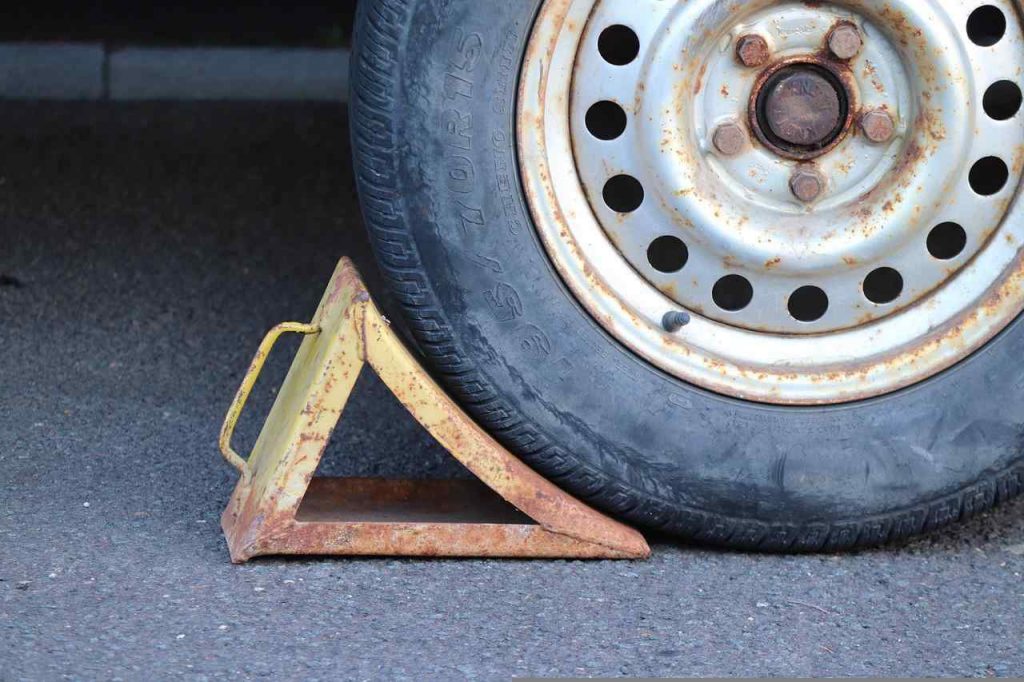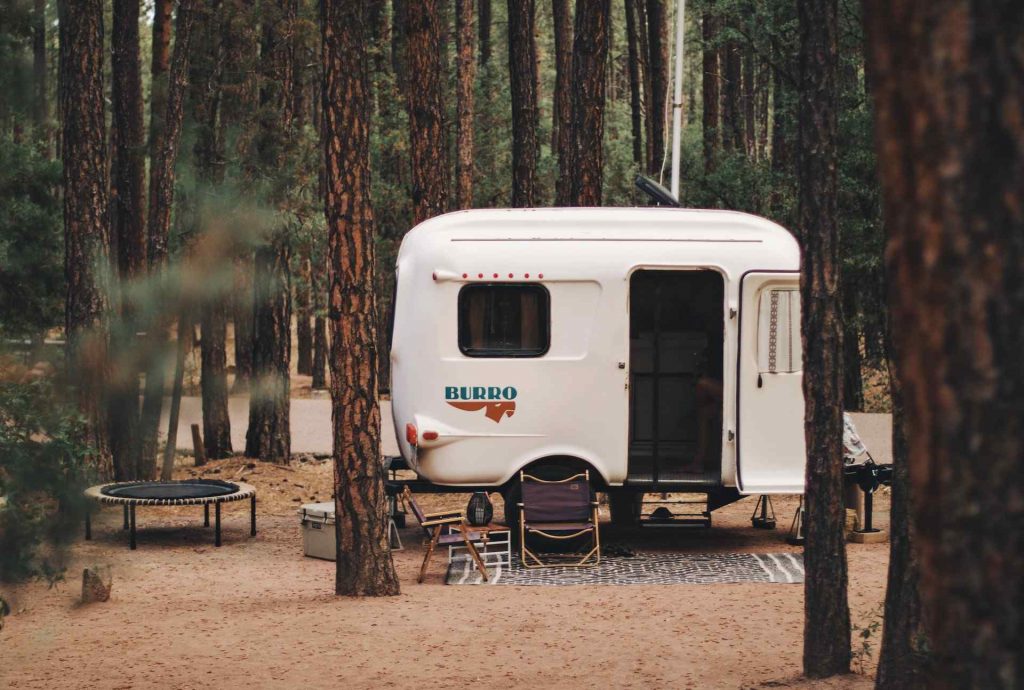Minimizing Chance of Theft
Before we jump into the various anti-theft devices and gadgets you can buy for your rig, let’s first talk about some measures you can take to reduce the risk of theft in the first place. While it’s nice to have gadgets that protect your camper from theft, it’s amazing to have the peace of mind that comes with knowing your camper doesn’t look like an easy mark to thieves.
Implement any or all of the following steps into your camping routine and your chance of falling victim to trailer theft will go way down.
Park in Populated Areas
Car thieves typically target cars that are parked on dark secluded streets. The cover of darkness gives them plenty of time and privacy to jimmy open doors and locks without being spotted. Avoid parking in areas like this.
While traveling with your trailer, you might have nights where you end up sleeping in a friend or relative’s house and need to leave your trailer parked and unoccupied overnight. If you find yourself in this situation, the absolute best place to park your camper is in the driveway of the house. If the driveway is unavailable or non-existent, then park your trailer right outside of the house, preferably under a streetlight.

The goal is to make your rig as conspicuous as possible. Park in an area that is well-lit and easy for you to keep an eye on from the windows of the house.
Eliminate Temptations
In order to determine if a car is worth breaking into, it is common for thieves to go around a street or parking lot and peer into the windows of various cars. This lets them take a look at what potential valuables are inside and if there is anyone occupying the vehicle. If a car is empty of people and full of high-value goods, that car will probably be broken into.
So, with this in mind, all efforts should be made to prevent thieves from looking into the windows of your travel trailer while you are away from it. The easiest way to achieve this is by remembering to pull the curtains tightly shut on all windows whenever you leave.
If the curtains in your rig are semi-transparent, consider upgrading to curtains that are light-blocking and can’t be seen through. The goal is to prevent thieves from being able to see what gear you have stashed in your rig, and to make it impossible to tell if it is occupied. Only a crazy person would attempt to steal a trailer that might have a person inside.
Turn It Around
The vast majority of travel trailers that are stolen are targeted because of the ease of access for thieves. These trailers are parked and left unhitched, alone, and without a tongue-lock. All a thief has to do is drive up, hitch up, and drive away. Easy-peasy.
So, it stands to reason that an easy way to deter a thief would be to make it difficult for them to hitch up to your camper in the first place. This can be done by turning your camper around so that the tongue faces away from the road. Any thief trying to drive your trailer from your campsite would first have to physically turn the entire trailer around before having access to hitch up.
To turn a trailer around by hand, you’ll need a fair amount of room to maneuver and a trailer hand truck. These wheeled contraptions allow trailers to be moved and repositioned without a vehicle.
Warning: Never attempt to move a travel trailer by hand on anything but perfectly level ground. If you remove your wheel chocks and try to move a trailer by hand while on a slope, I can almost guarantee you will lose control of your camper and it will roll away and crash. Just don’t try it.
Camp Around Others

What’s the old adage, something about safety in numbers?
A thief isn’t going to attempt to steal a trailer from a well-populated campground or boondocking location. Intentionally camping near fellow RVers allows you to use the presence of other people to protect your trailer while you are away from it.
Bonus points if you introduce yourself to your campsite neighbors. Introduce yourself and let them know how many people you are camping with and how long you will be there. Be friendly and make sure they get a good look at your face. Later, if they see a stranger poking around your campsite, they’ll know it isn’t you and either confront them or call the authorities.
Mark It Up
It’s one thing for a thief to steal a generic, common trailer that blends in with thousands of other trailers on the road. It’s another thing entirely (and quite unlikely) for a thief to steal a trailer that has been uniquely marked and stands out from the masses.
Painting a unique design or your camper’s name on its side will deter thieves from stealing it. If it does get stolen, the unique marks will make it easier for authorities to track and locate.
Not liking the idea of marking up your rig? Painting a unique design on the roof will at the very least aid police in searching for your rig, without ruining the aesthetic of your camper’s exterior.
Theft Prevention Systems
Sometimes people are determined to do bad things, and despite any precautions taken, your trailer may end up targeted by a thief. If this happens, you’ll want to have some secondary protection measures in place.
Numerous security devices and gadgets exist for the purpose of protecting trailers from theft and deterring thieves. With some of these gadgets being expensive and others quite cheap, you should be able to outfit your rig with one of these systems regardless of your budget.

Hitch Lock
Starting on the low end of the price spectrum we’ve got a nifty little contraption called a hitch lock. Hitch locks are designed for use while your trailer is still fully hitched up to your tow vehicle. They replace the non-lockable pin that comes standard with most ball-hitch assemblies with a sleek, lockable pin.
Once installed and secured, the ball of your tow vehicle cannot be removed from the hitch assembly without the key. In some regions, a hitch lock is referred to as a pin lock. Depending upon brand and quality, a hitch lock can be ordered online anywhere from $10 to $25.
When purchasing one for yourself, make sure to check that you are buying the correct size. The standard diameter for a hitch pin is 5/8″ but some hitch assemblies use a 1/2″ hitch pin. Never use a 1/2″ hitch pin in a hitch assembly that requires 5/8″. An inadequately sized pin can shear from towing forces and result in a runaway trailer.
Tongue Lock
Tongue locks come into play when your trailer is unhitched from your tow vehicle. While there are a variety of designs for tongue locks, most feature a standard hitch ball that is mounted on a steel locking mechanism with a heavy-duty U-bolt spanning over the ball.
With the U-bolt removed, the ball of the tongue lock fits into the empty tongue of a trailer. Once in this position, the U-bolt fits back into the mechanism and locks the ball of the tongue lock into place. This completely blocks access to the tongue of the trailer’s hitch assembly and prevents thieves from hitching their own tow vehicle to your trailer.
Tongue locks are also known as coupler locks and range from $20 to $50 in price.
Chock Lock
A chock lock prevents your trailer from being stolen by locking onto one of the wheels of your trailer and restricting that wheel’s ability to roll. Can’t drive away a trailer that won’t roll, right?
This type of wheel lock is incredibly easy to install on your trailer and in my opinion is a must-have security system for any trailer that is going to be left unattended for long periods of time. If you want to invest in a set of chock locks, expect to pay $40-$70 per lock.
Keep in mind that while chock locks do prevent a trailer from rolling and being towed, they are not a replacement for a traditional wheel chock. A chock lock should be used in addition to a wheel chock, not instead of a wheel chock.

Alarm System
Trailer alarm systems exist that are very similar to an alarm system designed for a residential home. Once installed, they alert the trailer owner via email or SMS if doors or windows on the rig have been opened, while simultaneously flashing lights and emitting an alarm sound.
Typically flashing lights and an alarm is enough to scare away thieves, but should they persist and manage to drive off with your trailer, some trailer alarm systems have a built-in GPS that allows the trailer to be tracked.
In addition to monitoring the status of doors and windows, trailer alarm systems can also be triggered by acceleration. This feature ensures that you will know if your trailer is being driven away, even if no windows or doors were tampered with.
Trailer alarm systems vary wildly in price. Some systems with very basic features will only cost around $30. Systems with many pieces and features can cost upwards $300-400.
GPS
Even without an alarm system, installing a GPS tracker on your trailer is a fantastic idea. A GPS will not prevent theft, but it will allow you to know the exact position of your trailer if it has been stolen. This information can then be relayed to proper authorities who will work to retrieve your trailer for you.
A magnetic GPS tracker that can connect to a smartphone costs around $30 online. When securing it to your rig, make sure it is well hidden, as some thieves know to look for them.

Frequently Asked Questions
See what our readers are asking us about protecting their trailers from theft.
Does RV insurance cover travel trailer theft?
The extent of your trailer coverage depends entirely upon your specific RV insurance plan. Typically, RV insurance with comprehensive coverage will cover trailer theft, but it’s best to verify the coverage before purchasing an insurance plan.
Are travel trailers easy to break into?
How easy a trailer is to break into depends largely on its age and manufacturer. Cheap older models have flimsy locks on the doors and windows that can be easily busted with the right tools. Nice modern RVs have strong, reliable locks that take more effort to break.
How do I prevent someone from stealing my travel trailer?
Close it up and lock it up. Lock all doors and windows and draw all curtains tightly shut. Install chock locks, hitch locks and tongue locks onto your rig so it not only is secure but looks secure as well.
Like I said at the beginning, a key part of protecting your trailer from theft is diligence. You can buy all of the gadgets and locks in the world, but they won’t do a whole lot if you consistently forget to use them.
While camping and adventuring, make a habit of fully securing your trailer every time you are away from it. Focus on building these habits until securing your trailer is worked into your natural camping flow.
Good luck and happy camping!



